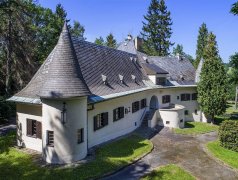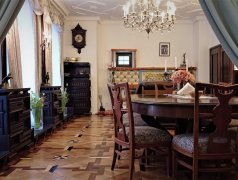Rýmařov town hall
Ancient dominant of former medieval marketplace and the whole town carries all styles, through which the town has undergone during its long existence thanks to frequent fires. Lower prismatic part of so called Town Tower, which has maintained its former defensive character of the last refuge and typical slotted loopholes are no older than from the turn of the 14th and 15th century. Bread benches were the oldest part, a small extension by the tower’s foot, which was unreasonably demolished shortly after 1945. The proof of the building’s renaissance existence is the illustration on maps of Pavel Fabricius from 1569 and 1575 and octagonal extension of the tower, which originally had simple pyramid casque. We know the early baroque reconstruction after the fire in 1668 from the town’s changes from 1693. The town hall's roof was made by two gables and the tower boasted by nice double bulbous baroque cupola, which was above the gallery. Firstly the tower clock with only one arm set the time in the town. The first floor could be reached only through outer wooden staircase. While the ground floor further served as market the area, where passing businessmen were disburdening their goods, there was a big hall for the meetings of the Town Council in the first floor, room for the Town Typist and a chamber for saving the archive and guns of the town funds. There were employed on the town hall only two employees together with the messenger, maximally there were two more catchpoles, councilman and mayor were executing their functions for free. It seems that there were taking place examinations of suspicious people in the cellar of the town hall and torture was used. 3. The town hall did not survive a terrifying fire on 3rd April 1790. The whole town and both its suburbs succumbed to it except for cellars and several stone ground floors. People were able to build again the whole Rýmařov together with its administration centre almost from the bases with the help of a series of Moravian towns and the Harrach family, but they constructed it into a charming Classicism and Empire style. The tower lost the gallery and it was covered by simplified classicist casque with a lantern and bells. Today's town hall has basically maintained its appearance, which it gained in 1808, when it was renovated including interesting contemporary interior, still attentive observer can easily find several older elements. The stone town symbol from 1844 is placed above the entrance. The last and very sensitive renovation works in 1991-4 enlarged its area by well used loft. The Marian column from 1683 is worth seeing with Ditrichstein and Hoffman symbols, its smallish shank with a cavity and interesting grating, the symbol of the chapel is capped by highly valued sculpture of praying Taintless Virgin Mary from František Leblos, who is sculptor from Olomouc. Another Olomouc Master Severin Tischler placed lower in 1733 the sculpture of the most important baroque saint Jan Nepomucký. Stone pillory from 1680 is not placed in the entrance part to the town museum in the lower part of the square.












